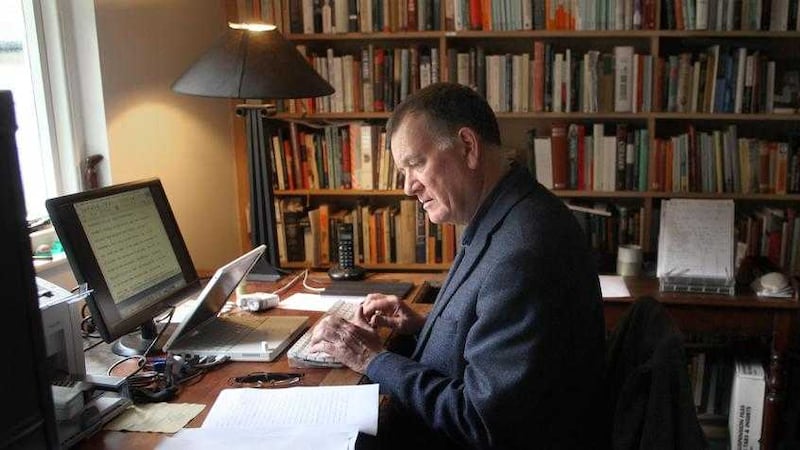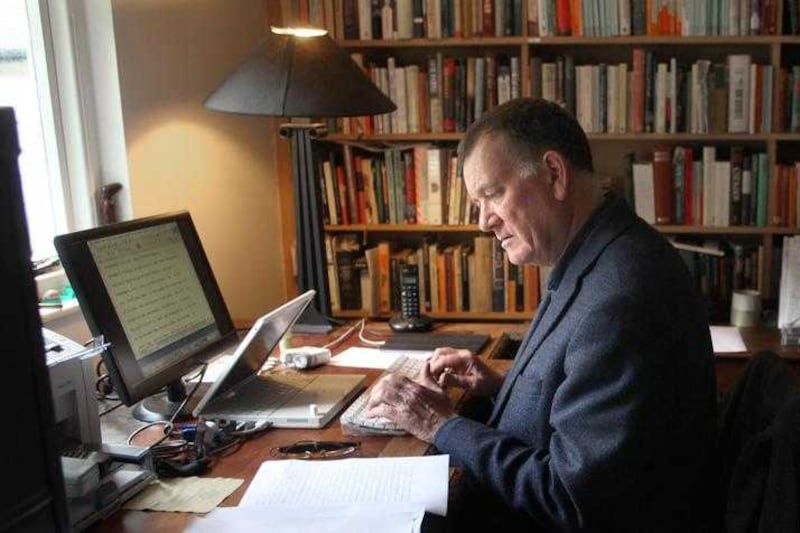BORN in Dublin, the eldest son of writer parents Ernest Gébler and Edna O'Brien, Fermanagh resident Carlo Gébler has enjoyed acclaim for his writing and for documentary film-making. The author of novels, short stories, radio and stage plays, he has also worked as a teacher and academic.
This month Gébler will be making a return visit to Armagh's John Hewitt International Summer School where he will be talking about the craft of short-story writing.
"Being on Grub Street involves nothing but permanent and indefatigable graft," says the straight-talking scribe, employing a term used to conjure up the lot of impoverished writers by referencing the street where in bygone times London's hacks lived and plied their wares.
So what advice will he be giving to budding writers wishing who want to join him there?
"The secret of writing is rewriting. It's not enough to decant what is in your head onto the page. You then have to comb it through and keep combing or sanding until it's a lovely smooth, shiny object," he says.
"I've just judged the International Dublin Literary Award. I read 160 novels and you do find yourself thinking when reading them that 'this is pretty good but if they had just edited it some more it would be even better'.
"I know Chekov never revised his work for first publication, but for most of us ordinary mortals we have to work.
"I just carry on editing until I'm absolutely sick and disgusted and then I know I'm finished.
Gébler, himself, who lives in Enniskillen, wakes each morning at 6am and confesses "I don't work well at night".
So, does he prefer writing short stories?
"Once you've written a short story you know so much that you might as well write the thing as a novel. The difficulty is containing it," says the 62 year-old.
His latest book, The Wing Orderly's Tales, consists of 12 interconnected short stories and is a hybrid of the two formats.
Set in the fictional HMP Loanend Prison in Belfast, it is narrated by inmate Chalky, whose position as orderly and go-between makes him a confidant of both prisoners and prison guards.
Combining humour, darkness and hope, it's a powerful book that explores the early causes and lifelong consequences of criminality, as well as the perverse unwritten rules and rituals and the humiliations that occur in prison.
While Gébler stresses that The Wing Orderly's Tales is purely fictional, he admits that the contents and storyline were influenced by 25 years working within its prison service setting in Northern Ireland.
He taught creative writing in HMP Maze from 1991 to 1997 before spending the next 18 years as an employee of the Prison Arts Foundation, working as a writer-in-residence at HMP Maghaberry.
He still holds a Saturday arts class in Hydebank Wood College, working alongside young offenders and female prisoners.
He spent five years writing The Wing Orderly's Tales – the main challenging being linking them into one book
"It's about when individual human beings meet a regime which has been specifically created by the criminal justice system and how they struggle to escape control," is how he describes it.
"I knew I wanted to have 12 short stories and I wanted to have one bit of post-modernism in that the narrator actually includes a story he has written and you can buy into the possibility he could be the author of the stories – because he has some literary competence.
"It also gave me the opportunity to have one story that lay outside the prison setting."
Gébler admits that working with prisoners over the past two and a half decades has defined not just this book, but his own personality and views on life.
"We tell ourselves as a society that everyone has choice, but you quickly discover by talking to people in prison that's an absolute lie, because choice is directly related to circumstance.
"Things like poverty, family dysfunction, alcoholism, bad housing, bad luck, a whole host of things inhibit your life choices. Most people who go to prison are not people like me."
Does he believe that literacy gives prisoners hope and a cathartic means of writing their wrongs?
"Traditionally prisons have been underpinned by overt Christian ideas that reflection leads to repentance. Because reflection is so complicated and troubling, you can't just think it – you have to write it.
"There is also something about being in prison that compels reconsideration of your life. Your mind starts questioning how you got here and therefore many prisoners are driven to write – either in poetry, drama, short story or essay.
"Sometimes this leads them into education, as most people who go to prison have not completed their GCSEs."
While Gébler is delighted to have witnessed some of the ex-prisoners he worked with go on to secure jobs which involved "the employment of words in a complex way", he feels that society inhibits prisoners becoming published writers.
"We have a bit of a problem in society – we don't really want to rehabilitate people as a society and one of the ways in which we can go on punishing them is inhibiting their cultural life."
Although his parents never encouraged his writing, nor gave him any advice, he does believe his early introduction to literature influenced his career path.
"I grew up in a house where the thoughts of literary values represented by the likes of Checkov, Katherine Mansfield, Pushkin, Joyce, Hemmingway and Fitzgerald were highly spoken off with approval – even awe. That primes you and points you in a certain direction."
Having written about his fraught relationship with his father in his 2001 memoir Father & I, Gébler speaks fondly of his mother, the acclaimed writer Edna O'Brien, best known for her controversial debut novel The Country Girls.
He says that she is a keen reader of his works and is working on a new novel herself.
A father-of-five, Gébler is almost proud of the fact that none of his own children have followed in his literary footsteps.
"One is a nutritionist, one is a trader in metals in Singapore, another is in the City of London, another is a linguist in Italy and the youngest is going to art school."
The writer's most recent work for television was The Siege (2013), about the 1689 siege of Derry, which he wrote and presented.
His next piece of creative writing involves a return to 1689 for a play entitled The Trial of Colonel Robert Lundy and an exploration into whether 'traitor' Lundy, was actually a victim of misrepresentation.
"The conceit in this play is that Lundy is brought back into the present day and is tried," he says.
:: Carlo Gébler will hold a Three Day Short Story Workshop at the John Hewitt Summer School, beginning July 25. For booking and full programme visit Johnhewittsociety.org. The Wing Orderly's Tales is published by New Island Press.



